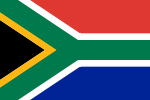Travel information South Africa
English, Afrikaans, South-Ndebele, isiXhosa, isiZulu, North-Sotho, South-Sotho, Setswana, Siswati, Tshivenda, Xitsonga
For South Africa no vaccinations are required. It is safe to eat fresh fruit and salads and to put as much ice as you like in your drinks Malaria within South Africa's borders is encountered mainly in: - northern and eastern Mpumalanga - northern KwaZulu-Natal - the border areas of the Northern and North West provinces It is best to contact your local travel clinic before traveling as to the latest recommendations for Malaria Prophylactics.
Pack clothing to suit the season and location of your visit. South Africa is coldest in a Cape Town winter or at night-time on the Highveld. The days can be very warm at any time of year, though, so bring plenty of cool clothing. In summer, don't forget beach wear. Remember a sun hat, particularly if you are going on safari, and sun protection cream. If You are heading into a malaria risk area, you will find full-length pants and socks (just make sure it is not too heavy –cotton is best) besides shorts and short-sleeved shirts / T-Shirts useful as well as spray-on mosquito repellent. Besides sandals, bring a good pair of practical walking shoes – you will probably be doing a fair amount of walking. Bring hiking boots if you plan on doing mountain trails. You also should bring a warm anorak or parka and scarf / gloves for the cold winter months (May to September) and light rain gear for summer months (late November to April – not for Cape Town, where it rains in winter (May-August/September)
The currency unit is the South African Rand (ZAR), denoted by the symbol R, with 100 cents making up one Rand. Foreign currency can be exchanged at local banks and Bureaux de Change. Visa and MasterCard are widely accepted throughout the country. American Express and Diners are less widely accepted. The South African Rand is also legal tender in Namibia, however the Namibian Dollar is NOT accepted in South Africa. The Namibian Dollar is fixed to and equals the Rand.
We highly recommend the conclusion of a travel health insurance.
All electrical appliances run on 220v. Outlets are round 3 pin, 15 amp plugs. Special adapters for video cameras, chargers and hairdryers are needed. These are readily available at supermarkets and hardware stores and are often supplied by hotel receptions. Most hotel rooms have 110 volt outlets for electric shavers and appliances. US-made appliances may need a transformer. Remote safari camps and lodges may not have 220v and may operate on generators / solar powered 12v electricity. Remember to bring spare batteries to have charged at the lodge while out on safari.
Central European Time (MET) +1 hour. During the European Summertime, there is no time difference between South Africa and Central Europe (MET).
International visitors traveling to South Africa must please ensure that their passport is valid for at least 30 days after their entry date and that they have a minimum of 3 blank pages (if there is insufficient space in the passport, then entry will be denied) in their passport to enable the entry visa to be issued. If a parent/guardian is traveling with a minor child/ren (aged 16 years or younger) then the parent/guardian must be in possession of a certified letter of consent from the non accompanying parent or guardian. Citizens of the United States and European Union do not need a visa for a stay of a maximum duration of 90 days at this time of writing. Please check with your consulate for updated information.

